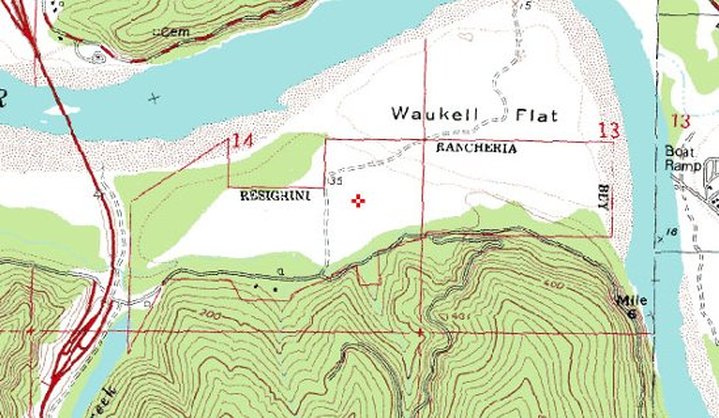
The Resighini Rancheria, just across the Klamath from Yurok Tribal Headquarters.
###
PREVIOUSLY:
###
Press release from the Yurok Tribe:
On May 6, 2016 the Yurok Tribe filed a case in the United States District Court of Northern California against Gary Dowd and the Resighini Rancheria to stop the unauthorized harvest of Klamath River salmon within the Yurok Reservation. Citing a lack of jurisdiction based on the sovereign immunity of the Rancheria, the magistrate dismissed the case on January 25, 2018. The Yurok Tribe emphatically disagrees with this decision.
“The Yurok Tribe is disappointed by the decision. We respect all tribes’ sovereign immunity. However, we remain concerned about individual Resighini members fishing illegally on the Yurok Reservation. This is particularly important when the resource at stake is in peril, like our salmon fishery. Any infringement of the Yurok Tribe’s exclusive fishing right inside the Yurok Reservation is very troubling, and could have lasting negative effects on the fishery as a whole and our ability to protect and manage resources within the Yurok Reservation. The Yurok Tribe is actively considering its best options to protect struggling salmon runs.”
Tribal and state law enforcement have cited Mr. Dowd and other members of the Resighini Rancheria numerous times for illegally harvesting fish from the Lower Klamath, yet the court’s ruling does not allow for the issue to be resolved.
“We have an obligation and a responsibility to stand up for the fish because they do not have a voice,” said Chairman Thomas O’Rourke.
The Yurok Tribe alone maintains federally protected Tribal fishing rights in the Lower Klamath River within the Yurok Reservation. In 1988, Congress enacted the Hoopa-Yurok Settlement Act (HYSA), which partitioned the then-existing reservation into two separate reservations for the Hoopa Valley Tribe and the Yurok Tribe.
The HYSA gave the Resighini Rancheria membership an opportunity to become members of the Yurok Tribe, and thereby participate in the Yurok Tribe’s reserved fishing right within the Yurok Reservation. Instead, the Rancheria’s membership — in exchange for a buy-out of $15,000 per-person — elected not to become Yurok Tribal members and take part in this and other rights enjoyed by Yurok tribal members.
At the time of the HYSA, Resighini members were aware of the consequences of choosing this option. Individual members agreed to the terms of the buy-out only after being informed in writing and in-person that they would “not thereafter have any interest or right whatsoever in the tribal, communal, or unallotted land, property resources, or rights within, or appertaining to … the Yurok Reservation or the Yurok Tribe.”
The Resighini Rancheria occupies land located entirely within the Yurok Reservation. Although some Rancheria members are of Yurok descent, they are not members of Yurok Tribe. Resighini Rancheria members who fish without a license from California or the Yurok Tribe are therefore engaging in “unregulated” fishing, which directly imperils the future of salmon on the Klamath.
Unregulated fishing of any kind weakens the conservation objectives that are in place for the protection of Klamath River fish. The quantity of fish harvested by Tribal and authorized state fishers in the legal Chinook salmon fishery is set by experts in salmon population dynamics. The allowable harvest for Tribal, commercial, and recreational fishermen is capped to allow a significant and specific number of salmon to reproduce, ensuring sufficient numbers in future years. Once the allowable harvest quantity is met, the respective managers shut down the tightly monitored fisheries. Any unregulated fishing jeopardizes the species’ ability to replenish subsequent stocks.
The Yurok Tribe is responsible for developing some of the most sophisticated fisheries and watershed restoration programs on the West Coast. Every year, the tribe invests millions of dollars in large-scale, river rehabilitation projects, which benefit fish, mammals and waterfowl. These restorative projects will not reach full potential while unauthorized fishing practices continue to occur.
In 2017, the salmon run on the Klamath River was the worst in recorded history and the Tribe’s allotment was less than one fish per every ten Tribal members. According to a common consensus among fisheries biologists, the outlook for the coming year is equally dismal. When fish numbers are this depressed, the damage done by poaching and unregulated fishing is much more drastic and can take decades to fix, because far fewer fish will be producing offspring. The Klamath River must be managed responsibly, and the fishery allowed the chance to rebound.
“The Yurok Tribe will vigorously defend its exclusive fishing right within the Reservation. The Tribe will defend the fish. We will find a way to preserve the fishery for future generations,” asserted Chairman O’Rourke.
CLICK TO MANAGE